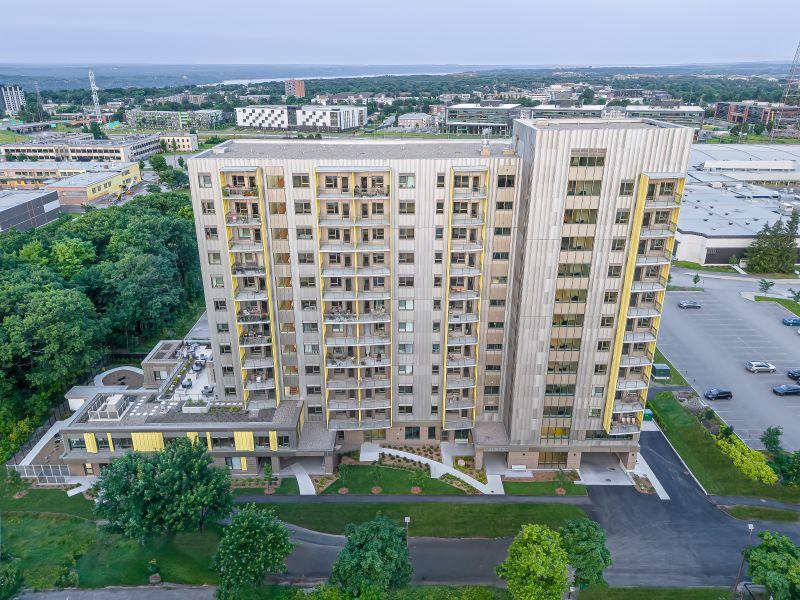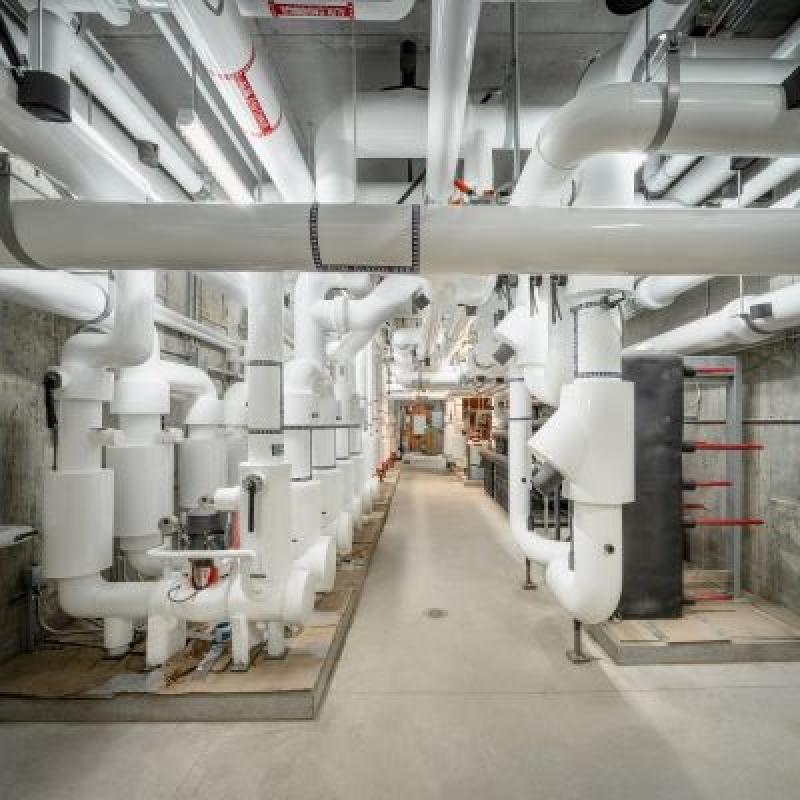
The team behind L'Albedo, a 128-unit, 12-storey affordable housing project in Quebec City, says the building leads on sustainability by tackling not only the root cause of climate change, but also its impacts on society.
Designed for semi-independent seniors and people with intellectual disabilities and special needs, L’Albedo took home the Inspiring Home award in the 2025 Canada Green Building Council (CAGBC) Awards. The project is an initiative of La Bouée, a Quebec-based affordable housing non-profit.
L’Albedo was recognized by the council for its array of sustainable attributes. The architecture optimizes energy performance and thermal comfort; a low-carbon concrete mix was used for the project; and it is heated and cooled using a geothermal system.
As a demonstration project of Quebec’s housing agency, the groups that worked on L’Albedo looked to showcase efficient construction, sustainability and quality of living environments, Élodie Simard, a senior principal at Lafond Côté Architectes and the principal architect of L’Albedo, said in a CAGBC webinar that discussed the building.
“What is important is to demonstrate that we can produce (a) building that answer(s) all the challenge(s) of climate change and public housing too,” Claude Routhier, a special projects advisor at Genecor Experts Conseils and Poly-Énergie, who led the integrated conception process for L’Albedo, said.
Simard and Routhier spoke to Sustainable Biz Canada in an interview after the webinar to delve into more detail about the sustainability of L'Albedo.
L’Albedo’s architecture
Finished in 2024, L’Albedo’s was designed for energy efficiency while maintaining indoor comfort, Dominic Tapin-Brousseau, an associate professional technologist at Lafond, explained in the webinar.
As one example, there are no connections between the concrete balconies and the concrete in the units. This severs a thermal bridge, which is a source of energy loss. The design choice guarantees minimum temperatures for the interior thresholds of the walls, “which are what ensure comfort inside,” Tapin-Brousseau said.
During the webinar, Simard pointed out the high-performance insulation in the building, triple-paned windows and thin aluminum cladding as choices to enhance the energy performance of the building envelope.
To tackle embodied carbon, the concrete mix was based on volatile ash rather than Portland cement. This reduced the embodied carbon of L’Albedo by 18 per cent compared to a conventional building.
Heat recovery system a highlight

A stand-out feature of L’Albedo is its heat recovery system. Thermal energy from a local ice rink (the Centre de glaces Intact Assurance) that would otherwise be vented into the atmosphere is instead channelled to L’Albedo’s geothermal system for heating and air conditioning.
Up to 5,000 kilowatt-hours of waste heat per day in the winter can be transferred from the Centre de glaces Intact Assurance to L’Albedo, Routhier said in the webinar.
Unlike many buildings of its kind, L’Albedo has air conditioning, he said. Given the health and advanced age of many of its residents, it was deemed critical to include such a feature for climate resiliency and the wellness of its residents.
“I think that it is a big mistake with climate change not to be able to do a social building without air conditioning,” Routhier said.
From its architecture and inclusion of the heat recovery system, L’Albedo exceeds the energy performance minimum for an all-electric building as required in Canada’s building code by 44 per cent.
Demonstrating comfort and sustainability in one project
When asked to reflect on the challenges of developing L’Albedo, Simard named two key obstacles.
Securing the funding was one major hurdle. L’Albedo was a “test project to demonstrate that highly efficient energy systems are also able to produce not only comfort but very low heating consumption in the building,” she said.
The team behind L’Albedo was able to secure tens of millions of dollars from the federal, provincial and municipal governments to help build the project. One tranche was over $19.6 million from the Quebec government.
Simard also recalled the problem of integrating all the bulky mechanical, electrical and geothermal systems while keeping it out of sight for the residents. It was addressed “by settling (the systems) under the building,” as Routhier explained.
Simard said she is “very proud to have gotten this beautiful (award)” for L’Albedo, which can serve as a model for future projects.










